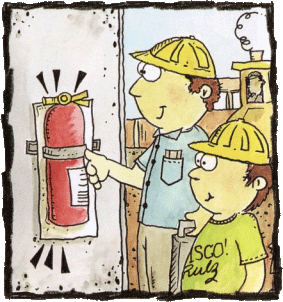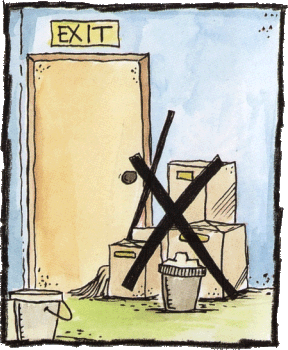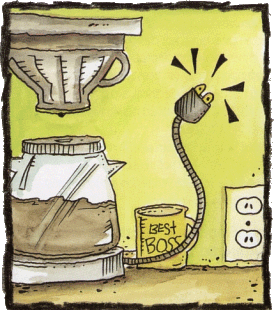At Work: Am I Fire Safe?
 |
| Teach fire safety awareness to all employees. |
IT CAN BE EASY, IF YOU DO THE FOLLOWING!
- Know your company's fire and emergency plans. These should be posted in a prominent location on every floor of the building.
- Participate in regular fire drills to ensure you are familiar with exits, pull stations and the location of fire extinguishers.
- Display emergency numbers on or near telephones.
- Co-workers with disabilities may need assistance during a fire drill.
- Know who is the fire warden on each floor of the building. Assist them to ensure you have a safe evacuation and safety programs in place.
WHAT ACTION SHOULD I TAKE IF THERE IS A FIRE?
- Sound the alarm and leave the building immediately, closing all doors behind you.
- Check doors before opening them. Stay low behind the door, reach up and feel the door and the door handle for heat. If the door feels cool, brace yourself against the door and open it slowly. If safe, leave the building. If you see smoke or flames shut the door and use an alternate exit.
- If smoke blocks your primary exit, use another one. If you must exit through smoke stay low by crawling on your hands and knees.
- Once outside, go to the designated meeting location away from the building. Ensure the fire department has been called.
- Do not re-enter the building, until told to do so by the fire department.
IF I DISCOVER A FIRE, SHOULD I USE A PORTABLE FIRE EXTINGUISHER?
Yes, ONLY if the following conditions apply:
- Everyone has left the fire area, and is evacuating the building.
- The fire department has been called.
- The fire is confined to a small area.
- A clear escape route exists behind you.
- There is an appropriate, working fire extinguisher available.
- You have read the extinguisher instructions and have received training in its safe operation.
IS THERE ANYTHING ELSE I NEED TO KNOW?
Practice good housekeeping, inside and out
 |
| Keep your workplace clutter free |
- Keep your workplace clutter free. Keep storage areas neat and clean and ensure that sprinkler heads are unobstructed. Exits and stairways are not storage areas. Keep them clear of debris.
- Keep flammable liquids stored in approved containers. Store larger quantities of flammable liquids in an approved storage cabinet.
- Ensure that you and your co-workers know and practice workplace emergency and security procedures.
- Maintain exterior lighting and keep shrubbery well trimmed.
Eliminate Electrical Hazards!
 |
| When not in use unplug or turn off all appliances. |
- Inspect electrical cords and plugs. Worn cords can cause fires, short circuits, and shocks. Replace cords that are worn or damaged.
- Do not use extension cords as permanent wiring. An extension cord is useful to bring temporary power to an area, but is not designed to take the place of permanent wiring. Improperly used or damaged extension cords can cause fires or result in injury.
- Do not overload electrical circuits or extension cords. Use an approved powerbar for extra electrical cords.
- Keep your lunchroom safe. Turn off and unplug all appliances when not in use.
- Provide adequate ventilation around all heat producing equipment.
Ensure Smoking Regulations Are Adhered To
- Only smoke in designated areas where large, deep and sturdy ashtrays are provided.
- Ensure visitors are aware of smoking regulations.
| Sponsored By: | ||||
 |
 |
 |
 Insurance InsuranceBrokers Association |
 |
| Greater Vancouver Fire Chiefs Association Public Education Committee | ||||
